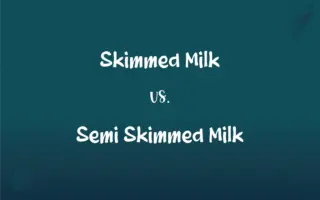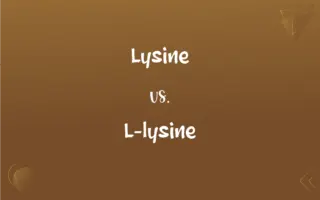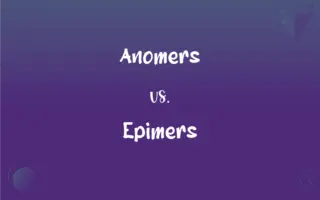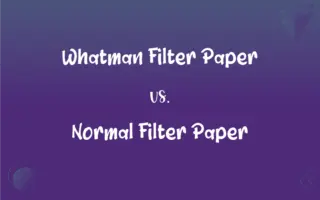Estuary vs. Delta: What's the Difference?
Edited by Aimie Carlson || By Janet White || Updated on August 8, 2024
An Estuary is where a river meets the sea, mixing freshwater with saltwater, while a Delta is land formed from sediment deposited at a river's mouth.
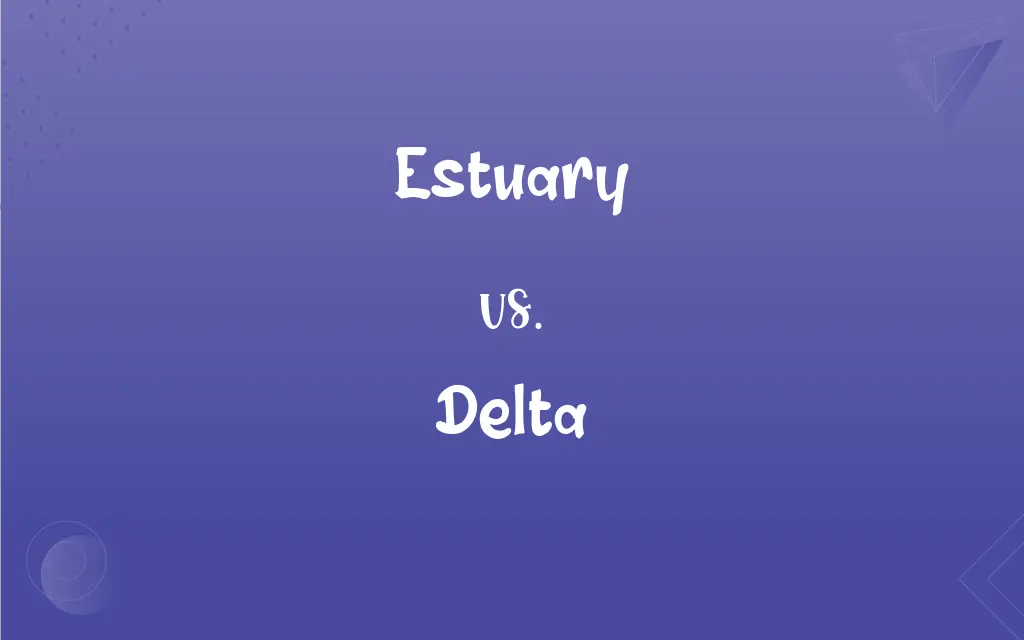
Key Differences
Estuary and Delta are both vital geographical features associated with the endings of rivers. An Estuary is essentially a tidal mouth of a river where freshwater from the river mixes with saltwater from the sea or ocean. On the contrary, a Delta is the landform that develops at the mouth of some rivers, created by the deposition of sediment carried by the river as the flow velocity decreases upon entering standing water.
Both Estuary and Delta serve as critical ecosystems supporting diverse flora and fauna. While the Estuary, with its brackish water, serves as a unique habitat for species adapted to both freshwater and marine conditions, the Delta is usually characterized by its fertile land due to the rich sediments, making it ideal for agriculture.
Estuaries play a pivotal role in filtering out pollutants from rivers before they reach the oceans, making them crucial for environmental health. In contrast, Deltas, with their expansive flatlands, often become locations for significant human settlements and agriculture, given their fertility.
In terms of their formation, the creation of an Estuary is influenced by tidal activities and the volume of freshwater discharge. Deltas, however, form when the sediment load of a river surpasses the capacity of the currents in the body of water it flows into, leading to sediment deposition.
Lastly, while Estuaries are zones of transition between freshwater and saltwater ecosystems, Deltas signify the endpoint of a river, marking the point where it disperses its load of sediments into a larger body of water.
ADVERTISEMENT
Comparison Chart
Definition
Tidal mouth of a river where freshwater meets saltwater
Landform made of sediment deposited at a river's mouth
Water Type
Brackish (mixture of freshwater and saltwater)
Freshwater, though near its end it may mix with saltwater
Ecosystem Role
Filters pollutants; transitional zone for species
Fertile lands; endpoint for river sediment deposition
Formation Influence
Tidal activities and freshwater discharge
Sediment deposition exceeding water body's current capacity
Significance
Environmental health and unique habitats
Agriculture and human settlements due to fertility
ADVERTISEMENT
Estuary and Delta Definitions
Estuary
Estuary is the tidal mouth of a large river.
The city is located near the estuary of the river.
Delta
Delta is a landform at the mouth of a river created by sediment deposits.
The Nile Delta is one of the most famous deltas in the world.
Estuary
Estuary is a transitional zone between river and marine environments.
The biodiversity in the estuary is vast due to its transitional nature.
Delta
Delta forms when a river's sediment deposition rate exceeds the removal rate.
The delta grows larger as more sediment accumulates over time.
Estuary
Estuary is a semi-enclosed coastal body of water.
Boats often dock in the sheltered areas of the estuary.
Delta
The fourth letter of the Greek alphabet. See Table at alphabet.
Estuary
Estuary is where freshwater and saltwater mix.
Species in the estuary have adapted to brackish conditions.
Delta
An object shaped like a triangle.
Estuary
Estuary serves as a natural filter for upland pollutants.
The estuary plays a vital role in cleaning the river water before it reaches the ocean.
Delta
A usually triangular alluvial deposit at the mouth of a river.
Estuary
The part of the wide lower course of a river where its current is met by the tides.
Delta
A similar deposit at the mouth of a tidal inlet, caused by tidal currents.
Estuary
An arm of the sea that extends inland to meet the mouth of a river.
Delta
(Mathematics) A finite increment in a variable.
Estuary
A coastal water body where ocean tides and river water merge, resulting in a brackish water zone.
Delta
Being in the fourth position relative to a designated carbon atom in an organic molecule at which an atom or a group may be substituted.
Estuary
An ocean inlet also fed by fresh river water.
Delta
Referring to the fourth of a group of isomers, or molecules of similar origin or properties, determined arbitrarily by those who discover or classify them. Used in combination.
Estuary
A place where water boils up; a spring that wells forth.
Delta
The fourth letter of the modern Greek alphabet Δ, δ.
Estuary
A passage, as the mouth of a river or lake, where the tide meets the current; an arm of the sea; a frith.
It to the sea was often by long and wide estuaries.
Delta
A landform at the mouth of a river where it empties into a body of water.
Estuary
Belonging to, or formed in, an estuary; as, estuary strata.
Delta
(international standards) nodot=1 NATO/ICAO Phonetic Alphabet.}}
Estuary
The wide part of a river where it nears the sea; fresh and salt water mix
Delta
(mathematics) The symbol Δ.
Delta
A small but noticeable effect. Compare epsilon.
This will slow the main code path down, but only by delta.
Delta
(computing) The set of differences between two versions of a file.
When you update the file, the system will only save the deltas.
Delta
A change in a quantity, likely from "d" for "difference".
ΔV - "delta vee"(change in velocity, used in rocketry and orbital mechanics)
Delta
(surveying) The angle subtended at the center of a circular arc.
Delta
A type of cargo bike that has one wheel in front and two in back.
Delta
The closed figure produced by connecting three coils or circuits successively, end for end, especially in a three-phase system.
Delta winding; delta connection; delta current
Delta
(finance) The rate of change in an option value with respect to the underlying asset's price.
Delta
(chemistry) A value in delta notation indicating the relative abundances of isotopes.
Delta
A military unit, nominally headed by a colonel, equivalent to a USAF operations wing, or an army regiment.
Delta
(astronomy) a star that is usually the fourth brightest of a constellation.
Delta
(physics) one of four baryons consisting of up and down quarks with a combined spin of 3/2: Δ++ (uuu), Δ+ (uud), Δ0 (udd), or Δ− (ddd)
Delta
(medicine) delta variant variant of the SARS-CoV-2 virus
Delta
(cryptography) To calculate the differences between the characters in an enciphered text and the characters a fixed number of positions previous.
Delta
(computing) To compare two versions of the same file in order to determine where they differ (where a programmer has made edits).
Delta
The fourth letter of the Greek alphabet (
Delta
A tract of land shaped like the letter delta (
Delta
The closed figure produced by connecting three coils or circuits successively, end for end, esp. in a three-phase system; - often used attributively, as delta winding, delta connection (which see), etc.
Delta
A low triangular area where a river divides before entering a larger body of water
Delta
The 4th letter of the Greek alphabet
Delta
Delta is where a river splits into several smaller channels.
The channels in the delta can change course after heavy rains.
Delta
Delta is characterized by its fertile soil.
The delta region is ideal for agriculture due to its rich soil.
Delta
Delta is often a flat plain region.
Settlements thrive in the delta region due to its flat landscape.
FAQs
Why are Deltas considered fertile?
Deltas are fertile due to the rich sediments deposited by rivers.
Is an Estuary a type of Delta?
No, an Estuary is a water body, while a Delta is a landform.
How does a Delta differ from an Estuary?
A Delta is a landform created by sediment deposits at a river's mouth, while an Estuary is where freshwater and saltwater mix.
Are Estuaries important for the environment?
Yes, Estuaries help filter pollutants and serve as unique habitats for various species.
What is an Estuary?
An Estuary is the tidal mouth of a river where freshwater mixes with saltwater.
Can large cities be found on Deltas?
Yes, many large cities are located on Deltas due to their flat and fertile land.
Is the water in an Estuary always brackish?
Mostly, as Estuaries are where freshwater and saltwater mix.
How do Deltas form?
Deltas form when a river deposits sediment faster than it's carried away by water currents.
Are Estuaries affected by tides?
Yes, Estuaries experience tidal variations.
What causes the branching in a Delta?
As sediment accumulates, the river splits into smaller channels, forming a Delta's branching pattern.
Can Deltas grow in size?
Yes, as more sediment is deposited, a Delta can expand.
Can Deltas be found at the mouths of all rivers?
No, only where sediment deposition outpaces its removal.
Is an Estuary saltier than the sea?
No, Estuaries are typically less salty due to the mix of freshwater.
Are Deltas prone to flooding?
Yes, due to their flat nature and proximity to the sea, Deltas are susceptible to floods.
Why are Estuaries considered ecologically significant?
They serve as habitats for numerous species and act as filters for upland pollutants.
Do humans impact Estuaries?
Yes, through pollution, development, and altering water flow, among other activities.
Are there different types of Deltas?
Yes, based on shape and formation, e.g., bird's foot, cuspate, or arcuate.
Can Estuaries be found in freshwater lakes?
Typically, Estuaries are associated with tidal waters and the sea, not freshwater lakes.
How do species adapt to life in an Estuary?
They develop traits to handle variations in salinity and tidal changes.
Why is the soil in Deltas suitable for agriculture?
The sediment deposited in Deltas is often nutrient-rich, making it ideal for cultivation.
About Author
Written by
Janet WhiteJanet White has been an esteemed writer and blogger for Difference Wiki. Holding a Master's degree in Science and Medical Journalism from the prestigious Boston University, she has consistently demonstrated her expertise and passion for her field. When she's not immersed in her work, Janet relishes her time exercising, delving into a good book, and cherishing moments with friends and family.
Edited by
Aimie CarlsonAimie Carlson, holding a master's degree in English literature, is a fervent English language enthusiast. She lends her writing talents to Difference Wiki, a prominent website that specializes in comparisons, offering readers insightful analyses that both captivate and inform.
















